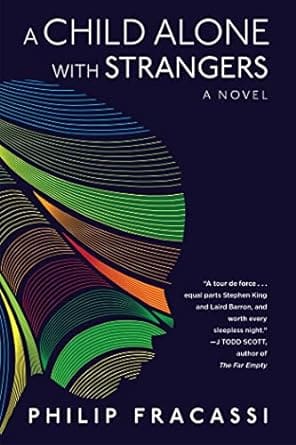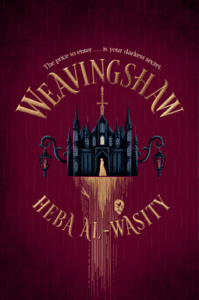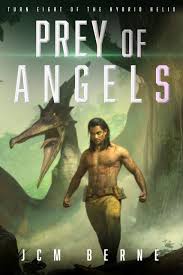
Synopsis:
When young Henry Thorne is kidnapped and held prisoner in a remote farmhouse surrounded by miles of forest, he finds himself connecting with a strange force living in the woods—using that bond to wreak havoc against his captors. Unknown to the boy, however, is that this ancient being has its own reasons for wanting the interlopers gone—there is something hidden beneath the house, tucked away in the dark, damp root cellar . . . waiting for its return.
Review:
Fracassi’s “A Child Alone With Strangers,” is a richly-layered, high-octane, supernatural creature feature that’s well worth its weight. Whilst it’s quite the door-stop, clocking in at just under 600 pages, it goes fast, the pacing is break-neck. Grisly in some areas (one scene in particular springs to mind) yet introspective throughout, if you’re looking for great writing, great commentary, and a whole lot of creepy crawlies, “A Child Alone With Strangers,” is the novel for you.
We follow Henry Thorne, who by the age of 9, has encountered more misfortune than I hope most of us will face in our entire lives. After a shocking incident, which claimed his single father’s life, Henry ends up with a hefty settlement, and a new home with his Aunt Mary and Uncle Dave. He seems to be settling in, however his progress is hindered by the fact he seems to have woken up on the wrong side of the supernatural. Henry has been bestowed with the power to read minds, see emotions, and even communicate with others telepathically. Perhaps, had notorious crime boss Jim Cady known this, he wouldn’t have done it. Cady and his motley crew: Liam, Greg, Jenny and Pedro abduct Henry from his school, and harbour him in a house buried deep in the woods, holding him for ransom in the hope of getting a nice chunk of Henry’s 2.5 million dollar settlement. The house in question however is not quite as abandoned as it seems. Lurking below it is an angry mother, a monster who is not fond of unexpected guests. With his new found abilities, Henry has a direct line of communication with the monstrous matriarch, and she’s more than happy to make life very uncomfortable for Jim and his gang.
“A Child Alone With Strangers,” is a novel about empathy. Within horror books, empathy is often used to drive internal moral battles within the reader, and Fracassi has us squabbling with ourselves from the word GO. Henry’s father’s “incident,” is self-inflicted and driven by self-hatred, but also threatens the life of his son, who has yet to even reach adolescence. The act is, in one word, unforgivable (something Henry’s Uncle Dave grapples with) yet we’re forced to reconcile Mr Thorne’s utter despair, stemming from the loss of his wife and livelihood, as well as an uncertain future. It’s in situations like this that readers can not excuse the behaviour, but have to consider it as a vital piece of information. Sometimes good people do bad things.
Things get decidedly more complicated however, when bad people do good things. Liam is debatably the most complicated character featured in “A Child Alone With Strangers.” He is an abductor, he abuses Henry, he threatens to kill him, and most of the time? He means it. However, he has what the other gang members lack, which is a semblance of humanity, of conscience. He is an indisputably bad person, but when we read from his perspective, learn of his own son, we can’t help but see the shades of grey in his character. Our empathy for the gang members doesn’t stop there- limits are pushed further. Jenny and Greg are siblings with a rather unsettlingly close relationship. Jenny is a psychopath, and should it benefit her, she’d be more than happy to murder Henry, and Greg… doesn’t really think much. They are gross, despicable people, and there’s no excuse for their repugnant actions, but when their traumas are laid bare, readers have to consider the roots of their monstrous behaviour.
This moral tug of war extends beyond the human cast. The monster living below, named “Mama,” tortures the houses’ inhabitants. She unleashes plagues of insects, putting Henry and the others in harm’s way time and time again. But, she does so out of primal instinct, in order to protect her child. Is her response any different from the protective efforts of Aunt Mary, Uncle Dave, and the FBI? It’s up to you. All in all, this invitation not to forgive, but to understand Fracassi’s characters, elevates the novel from simply good vs. evil to a profound exploration of empathy and morality.
Trying to fit “A Child Alone With Strangers,” into one sub-genre is tough. It’s fantastical, it’s police-procedural, but above all, I would suggest that it’s cosmic. Our monster feels ancient, is able to control animals and insects, and unleash them upon the gang as if they were the plagues. Henry and the monster are able to communicate with one another telepathically, and better yet, Henry often finds solace and advice in a mysterious spirit. By situating Henry’s personal struggles within a universal context, Fracassi explores our place in the vast and often indifferent cosmos- it’s somewhat of a humbling and existential experience.
Anyone who’s read any of Fracassi’s work, knows that the man can write. He takes the hallmarks of the horror greats, with King and McCammon springing to mind, and combines it with the modern flair of some of my current favourites, Ronald Malfi, Tim Meyer, Tyler Jones. From his pacing, to his prose, the only part of “A Child Alone With Strangers,” that is difficult to read is the content- which is just how I like it.
In conclusion, “A Child Alone With Strangers,” is a sub-genre blending juggernaut which masterfully tugs at the heart-strings, and fucks with the moral compass. It’s a creepy, empathetic and existential part supernatural thriller, part cosmic mind bender, that’s well worth your time and energy.









Leave a Reply